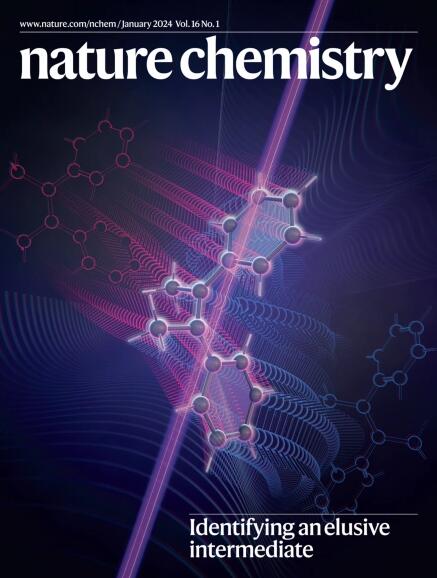四硫酸锌中心对质子泵抑制剂雷贝拉唑的位点特异性激活
IF 19.2
1区 化学
Q1 CHEMISTRY, MULTIDISCIPLINARY
引用次数: 0
摘要
质子泵抑制剂已经成为全球最畅销的药物。质子泵抑制剂是在酸性环境中被质子化激活的前药,它通过共价修饰胃质子泵来抑制胃酸分泌。尽管它们被广泛使用,但非酸性环境下的其他激活机制和潜在靶蛋白仍然知之甚少。采用化学蛋白质组学方法,我们发现质子泵抑制剂雷贝拉唑选择性地与锌结合蛋白形成共价偶联物。重点关注DENR,一种具有C4锌簇(即由四个半胱氨酸配位的锌)的蛋白质,我们发现雷别拉唑被锌离子激活并随后偶联到锌配位半胱氨酸上。我们的结果表明,在锌配位球内,药物结合、活化和偶联发生迅速。最后,我们提供的证据表明,其他质子泵抑制剂可以以同样的方式被激活。我们得出结论,锌作为路易斯酸,无需低pH值,促进非酸性环境中质子泵抑制剂的活化和偶联。本文章由计算机程序翻译,如有差异,请以英文原文为准。


Site-specific activation of the proton pump inhibitor rabeprazole by tetrathiolate zinc centres
Proton pump inhibitors have become top-selling drugs worldwide. Serendipitously discovered as prodrugs that are activated by protonation in acidic environments, proton pump inhibitors inhibit stomach acid secretion by covalently modifying the gastric proton pump. Despite their widespread use, alternative activation mechanisms and potential target proteins in non-acidic environments remain poorly understood. Employing a chemoproteomic approach, we found that the proton pump inhibitor rabeprazole selectively forms covalent conjugates with zinc-binding proteins. Focusing on DENR, a protein with a C4 zinc cluster (that is, zinc coordinated by four cysteines), we show that rabeprazole is activated by the zinc ion and subsequently conjugated to zinc-coordinating cysteines. Our results suggest that drug binding, activation and conjugation take place rapidly within the zinc coordination sphere. Finally, we provide evidence that other proton pump inhibitors can be activated in the same way. We conclude that zinc acts as a Lewis acid, obviating the need for low pH, to promote the activation and conjugation of proton pump inhibitors in non-acidic environments. Proton pump inhibitors (PPIs) are prodrugs that are activated by protonation in the highly acidic environment of the stomach lining. Now, coordination of PPIs to protein-bound zinc ions is revealed as another pathway to PPI activation. Acting as a Lewis acid, the zinc ion facilitates conjugation of the drug to zinc-coordinating cysteine residues.
求助全文
通过发布文献求助,成功后即可免费获取论文全文。
去求助
来源期刊

Nature chemistry
化学-化学综合
CiteScore
29.60
自引率
1.40%
发文量
226
审稿时长
1.7 months
期刊介绍:
Nature Chemistry is a monthly journal that publishes groundbreaking and significant research in all areas of chemistry. It covers traditional subjects such as analytical, inorganic, organic, and physical chemistry, as well as a wide range of other topics including catalysis, computational and theoretical chemistry, and environmental chemistry.
The journal also features interdisciplinary research at the interface of chemistry with biology, materials science, nanotechnology, and physics. Manuscripts detailing such multidisciplinary work are encouraged, as long as the central theme pertains to chemistry.
Aside from primary research, Nature Chemistry publishes review articles, news and views, research highlights from other journals, commentaries, book reviews, correspondence, and analysis of the broader chemical landscape. It also addresses crucial issues related to education, funding, policy, intellectual property, and the societal impact of chemistry.
Nature Chemistry is dedicated to ensuring the highest standards of original research through a fair and rigorous review process. It offers authors maximum visibility for their papers, access to a broad readership, exceptional copy editing and production standards, rapid publication, and independence from academic societies and other vested interests.
Overall, Nature Chemistry aims to be the authoritative voice of the global chemical community.
 求助内容:
求助内容: 应助结果提醒方式:
应助结果提醒方式:


